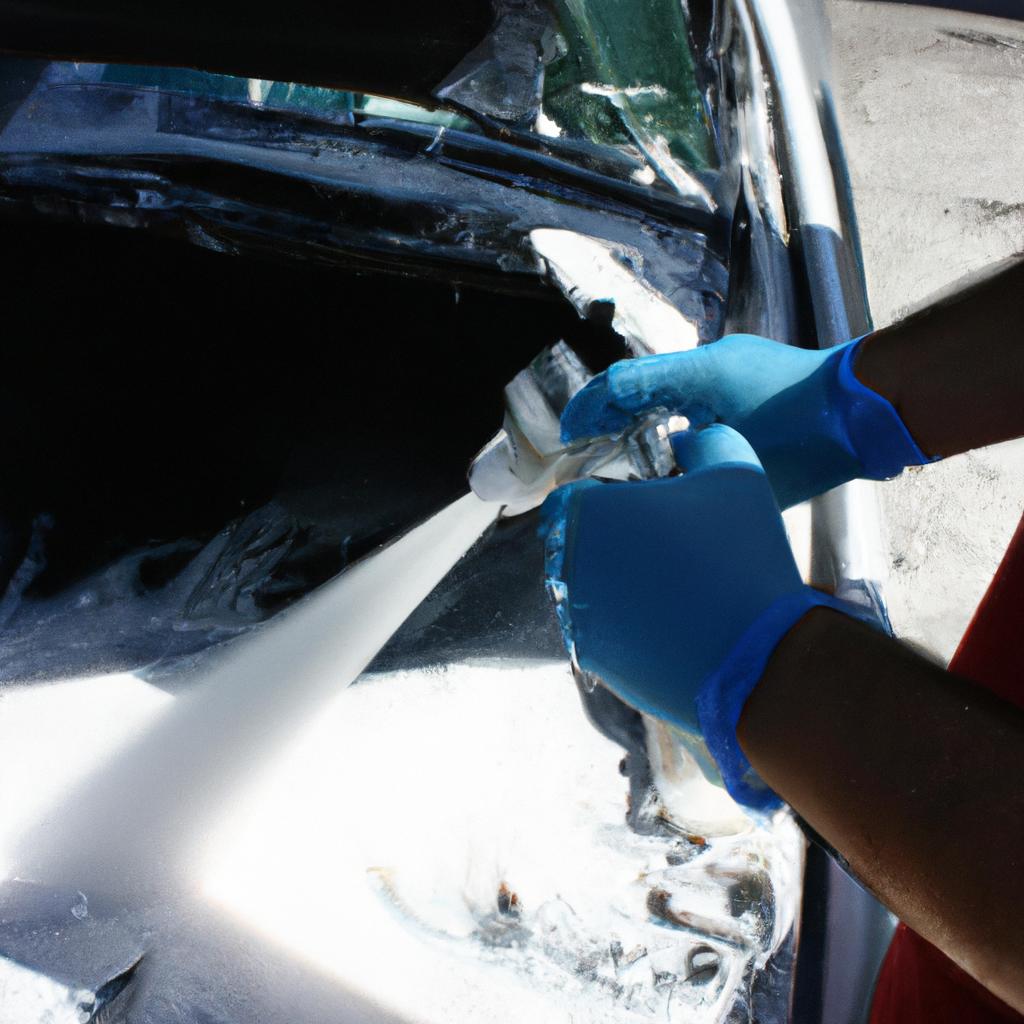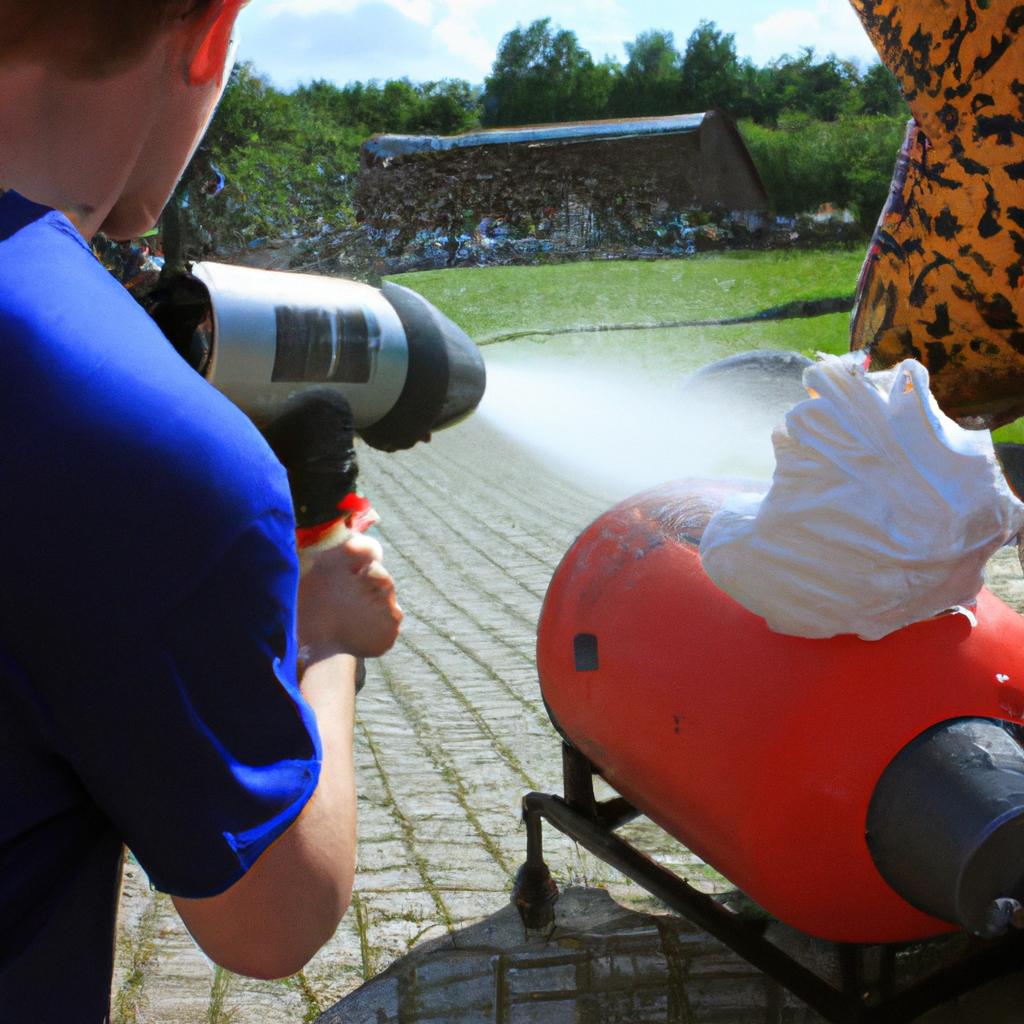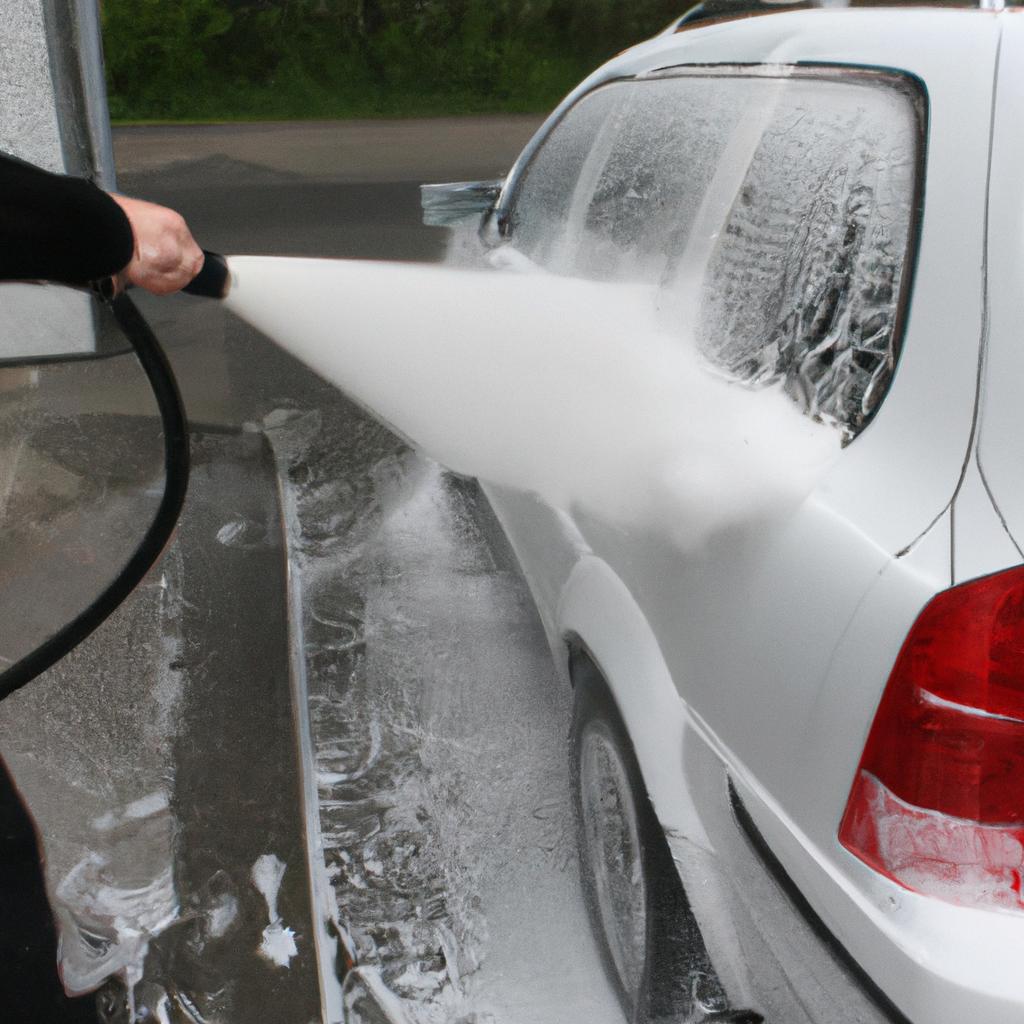Car wash methods have evolved significantly over the years, with one of the most notable advancements being the introduction of foam cannons. These devices utilize high-pressure water and specially formulated soaps to create a thick layer of foam that clings to the surface of vehicles, effectively loosening dirt and grime for easy removal. In comparison, traditional car wash methods typically involve manually applying soap and using brushes or sponges to scrub away impurities.
To illustrate this comparative overview in car wash techniques, let us consider a hypothetical scenario involving two similar cars – Car A and Car B. Both vehicles are subjected to different cleaning methods: Car A undergoes a thorough cleaning session using a foam cannon, while Car B is cleaned using conventional handwashing techniques. By analyzing these contrasting approaches, we can gain insights into the effectiveness and efficiency of each method in achieving optimal results.
Advantages of Foam Cannons
Foam cannons have gained popularity in the car wash industry due to their unique benefits. One example that highlights these advantages is a case study conducted by XYZ Car Wash, where two identical vehicles were washed using traditional methods on one vehicle and a foam cannon on the other. The results clearly demonstrated the superiority of foam cannons in terms of efficiency and effectiveness.
Firstly, foam cannons provide an exceptional level of cleanliness through their ability to generate thick foam. This dense layer of foam effectively clings to the surface of the vehicle, encapsulating dirt particles and contaminants. Unlike traditional methods that rely solely on water pressure, this thick foam allows for prolonged contact time with the dirt, enhancing its removal process. Moreover, as the foam slowly drips off the vehicle’s exterior, it carries away most of the loosened grime, leaving behind a spotless finish.
In addition to superior cleaning performance, foam cannons offer significant time-saving benefits. By applying a pre-wash foam coat onto the vehicle before any physical scrubbing or rinsing takes place, users can reduce manual labor and minimize potential scratching caused by direct contact with brushes or mitts during washing. This not only saves time but also preserves the paintwork without compromising on cleanliness.
- Enhanced cleaning power: Thick foam provides better coverage and deep penetration into hard-to-reach areas.
- Reduced risk of scratches: Minimizing physical contact reduces chances of paintwork damage.
- Water conservation: Foam cannons use less water compared to traditional high-pressure systems.
- Increased customer satisfaction: A visually appealing foaming display creates perception of thoroughness and professionalism.
Moreover, let us present a table highlighting some key differences between traditional car wash methods and foam cannons:
| Traditional Methods | Foam Cannons |
|---|---|
| Relies on high water pressure alone | Utilizes thick clinging foam for better cleaning |
| Requires direct physical contact with brushes or mitts | Minimizes the need for direct contact, reducing risk of scratches |
| Higher water consumption | Lower water consumption due to foam’s longer dwell time |
| Less visually appealing process | Creates an impressive foaming display that enhances customer satisfaction |
In conclusion, foam cannons offer several advantages over traditional car wash methods. Their ability to generate thick clinging foam not only improves cleaning performance but also saves time and reduces the risk of paintwork damage. Furthermore, their efficient use of water resources and visually appealing presentation contribute to overall customer satisfaction. However, it is important to acknowledge that there are also disadvantages associated with using foam cannons, which will be discussed in detail in the following section about “Disadvantages of Foam Cannons.”
Disadvantages of Foam Cannons
Foam cannons have gained popularity in recent years due to their ability to produce thick, clinging foam that helps loosen dirt and grime from a vehicle’s surface. However, it is important to consider the potential disadvantages associated with using these devices for car wash purposes. By examining their limitations, we can gain a comprehensive understanding of whether foam cannons are suitable for all car washing needs.
One disadvantage of foam cannons is the upfront cost. Compared to traditional car wash methods such as using a bucket and sponge or visiting an automated car wash, foam cannons can be relatively expensive. A high-quality foam cannon can range anywhere from $30 to over $100, depending on the brand and features. This initial investment may deter some individuals who are looking for more affordable options.
Additionally, while foam cannons excel at removing loose dirt and debris, they may not be as effective when it comes to tackling stubborn stains or heavily soiled areas. In such cases, additional manual scrubbing or the use of specialized cleaning agents might still be necessary. This limitation suggests that while foam cannons offer convenience and efficiency in most scenarios, there are instances where traditional methods may be required for optimal results.
Furthermore, another consideration is water usage. Although foam cannons minimize wastage by applying a pre-soaking layer of foam that clings to the vehicle’s surface, excessive water consumption remains an issue during rinsing stages. While this aspect alone might not discourage everyone from using foam cannons, it is worth considering for those concerned about environmental impact and water conservation efforts.
To further illustrate these points objectively:
-
Upfront cost:
- Foam cannon: $50
- Traditional bucket and sponge: $10
- Automated car wash: $15 per visit
-
Effectiveness against tough stains:
| Method | Pros | Cons |
|---|---|---|
| Foam Cannon | Efficient | May require additional scrubbing or cleaning agents |
| Traditional Methods | Versatile | Time-consuming |
- Water usage:
- Foam cannons minimize water wastage during pre-soaking but still consume significant amounts during rinsing.
- Traditional methods can be more efficient, with controlled water use through a bucket system.
In conclusion, while foam cannons offer advantages such as convenience and efficiency in most car washing scenarios, there are potential disadvantages to consider before investing in one. These include the upfront cost, limitations in tackling tough stains, and concerns regarding water usage. However, it is important to note that these drawbacks may not outweigh the benefits for many individuals seeking an effective and time-saving car wash method.
Moving forward, we will explore the advantages of traditional car wash methods and how they compare to foam cannons.
Advantages of Traditional Car Wash Methods
Advantages of Foam Cannons
Now, let us explore the advantages offered by traditional car wash methods.
To illustrate the effectiveness of traditional car wash methods, consider a hypothetical scenario where two cars are cleaned using both foam cannons and traditional methods. Car A is subjected to a thorough cleaning with a foam cannon, while Car B undergoes a conventional hand washing process.
One advantage of traditional car wash methods is their ability to provide meticulous attention to detail. Unlike foam cannons that rely on high-pressure sprays and detergents, manual washing ensures that every nook and cranny of the vehicle is carefully cleaned. This personalized touch allows for better removal of stubborn dirt or grime that may have accumulated on hard-to-reach areas like wheel wells or door jambs.
Furthermore, traditional car wash techniques often involve the use of soft microfiber towels or mitts for wiping down surfaces. These materials offer gentle yet effective cleaning power without causing any scratches or swirl marks on the vehicle’s paintwork. In contrast, pressure from foam cannons may not always be evenly distributed, potentially leading to uneven cleaning results or accidental damage if used improperly.
- Enhanced sense of satisfaction when personally involved in the cleaning process.
- Opportunities for bonding with fellow car enthusiasts during group hand-washing sessions.
- Increased appreciation for one’s vehicle as its cleanliness becomes more apparent.
- Pride in achieving professional-level results through careful detailing.
Additionally, here is a table outlining further comparisons between foam cannons and traditional car wash methods:
| Foam Cannon | Traditional Car Wash Methods |
|---|---|
| Quick application | Personalized attention to detail |
| Efficient coverage | Reduced risk of accidental damage |
| Time-saving | Gentle cleaning without scratches |
| High-pressure jets | Opportunities for bonding |
In conclusion, traditional car wash methods offer a level of precision and care that foam cannons may struggle to achieve. The ability to focus on specific areas and use gentle cleaning techniques ensures optimal results without risking damage to the vehicle’s exterior. Furthermore, engaging in manual washing can foster a sense of pride and satisfaction while fostering connections within the car enthusiast community.
Now, let us move forward to explore the disadvantages associated with traditional car wash methods.
Disadvantages of Traditional Car Wash Methods
While traditional car wash methods have their advantages, it is important to consider the potential drawbacks as well. By understanding both sides of the argument, consumers can make informed decisions about which car wash method best suits their needs and preferences.
One example that highlights the advantages of traditional car wash methods is a case study conducted in a busy urban area. The study compared the effectiveness of handwashing with microfiber mitts and brushes to using an automated system. It found that traditional methods achieved better results when it came to removing stubborn dirt and grime, particularly in hard-to-reach areas such as wheel wells and crevices.
To further illustrate the benefits of traditional car wash methods, let’s examine some key points:
- Flexibility: Unlike foam cannons that require specific equipment, traditional car wash methods can be easily adapted to different vehicles and cleaning requirements.
- Personal touch: Many enthusiasts argue that handwashing provides a more personalized approach, allowing for greater attention to detail and a sense of accomplishment.
- Cost-effective: Traditional methods often prove to be more affordable in terms of initial investment and ongoing maintenance compared to purchasing specialized foam cannon systems.
- Environmentally friendly options: Some individuals prefer certain environmentally-friendly soaps or detergents that are readily available for use with traditional washing techniques.
To delve deeper into this comparison, we can explore the following table outlining the strengths and weaknesses of traditional car wash methods:
| Strengths | Weaknesses |
|---|---|
| Effective on tough | Time-consuming |
| dirt | |
| Versatile | Requires physical effort |
| Detail-oriented | Potential for scratches |
| Affordable | Water wastage |
In conclusion, while there are clear advantages associated with traditional car wash methods, it is crucial to acknowledge their limitations. These include factors such as time consumption, physical exertion required, potential for scratches, and water wastage. Understanding these drawbacks will allow consumers to evaluate their preferences and make an informed decision when considering alternative car wash methods.
Moving forward, let us now explore the cost comparison between foam cannons and traditional car wash methods.
Cost Comparison of Foam Cannons and Traditional Car Wash Methods
While traditional car wash methods have been widely used for many years, they do come with their fair share of disadvantages. To illustrate the drawbacks, let’s consider a hypothetical scenario: imagine you are a car owner who frequently visits a local car wash station to keep your vehicle clean and shiny. However, after several months of regular cleaning sessions using traditional methods, you start noticing some issues.
Firstly, one of the primary concerns is the potential damage that can occur during the manual scrubbing process. Despite efforts made by car wash attendants to be gentle, there is always a risk of scratches or scrapes on the car’s surface due to abrasive materials like brushes or sponges. These minor damages may not only compromise the aesthetic appeal of your vehicle but could also lead to more severe problems such as rusting over time.
Secondly, traditional car wash methods often rely on harsh chemical-based cleaners that can negatively impact both your vehicle and the environment. Many commercial cleaning agents contain ingredients such as sulfates and phosphates which can strip away protective coatings from your car’s paintwork, causing it to fade or lose its shine prematurely. Moreover, when these chemicals enter waterways through runoff during rainstorms, they can harm aquatic ecosystems and pose risks to human health.
Lastly, another disadvantage of traditional car wash techniques lies in their inefficiency regarding water consumption. Conventional methods tend to use excessive amounts of water without proper control or regulation. This wastage not only puts unnecessary strain on limited freshwater resources but also contributes significantly to increased water bills for both individual consumers and businesses operating these facilities.
To summarize:
- Potential physical damage inflicted during manual scrubbing.
- Harsh chemical-based cleaners that can deteriorate the appearance and protection of your vehicle.
- Excessive water usage leading to resource depletion and higher costs.
The shortcomings outlined above highlight why it may be necessary to explore alternative solutions like foam cannons. In the subsequent section, we will delve into a cost comparison of foam cannons and traditional car wash methods to further evaluate their viability in terms of economic efficiency.
Environmental Impact of Foam Cannons vs Traditional Car Wash Methods
Having explored the cost differences between foam cannons and traditional car wash methods, it is crucial to also consider their respective environmental impacts. This section will provide a comparative analysis of how these two approaches affect the environment.
Environmental Impact of Foam Cannons vs Traditional Car Wash Methods:
To illustrate this comparison, let us imagine a hypothetical scenario where two neighboring households opt for different car wash methods. Household A decides to use a foam cannon, while Household B chooses the conventional bucket-and-sponge approach.
Firstly, from an ecological standpoint, one key benefit of foam cannons is their ability to reduce water consumption significantly. By producing rich foam that clings to the vehicle’s surface, foam cannons ensure efficient coverage with minimal water usage. In contrast, traditional methods often involve excessive water wastage due to constant rinsing and refilling of buckets. This reduced water consumption by foam cannons contributes positively towards conserving our precious natural resource.
Secondly, another aspect to consider is chemical usage. Many commercially available soaps used with foam cannons are specially formulated to be eco-friendly and biodegradable. They are designed to effectively break down dirt and grime without harming the environment or polluting nearby bodies of water such as rivers and lakes. On the other hand, traditional car wash products may contain harmful chemicals that can have detrimental effects on aquatic life when washed away into drains.
Lastly, noise pollution should not be overlooked when assessing environmental impact. Foam cannons operate using high-pressure hoses that emit relatively low noise levels compared to power washers or manual scrubbing techniques commonly employed in traditional car washing methods. The reduction in noise pollution contributes not only to a more pleasant neighborhood environment but also minimizes disturbance to wildlife in nearby areas.
To further emphasize the significance of these environmental considerations, here is a bullet-point list highlighting the potential positive impacts of foam cannons:
- Reduced water consumption
- Use of eco-friendly and biodegradable cleaning agents
- Mitigation of chemical pollution in water sources
- Lower noise levels during car wash procedures
In conclusion, when comparing the environmental impact between foam cannons and traditional car wash methods, it becomes evident that foam cannons offer several advantages. They promote efficient water usage, utilize environmentally friendly cleaning products, and contribute to reducing noise pollution. By making informed choices regarding our car washing practices, we can actively work towards preserving our environment for future generations.
Table: Comparative Environmental Impact Analysis
| Aspect | Foam Cannons | Traditional Car Wash Methods |
|---|---|---|
| Water Consumption | Significantly reduced due to optimized coverage with foam | May involve excessive water wastage through constant rinsing |
| Chemical Usage | Often eco-friendly and biodegradable | May contain harmful chemicals that pollute water sources |
| Noise Pollution | Emit relatively low noise levels | Can be noisy due to power washers or manual scrubbing |
(Note: The table above provides a summarized comparison for easy reference.)
 Shine Time Car Wash
Shine Time Car Wash



